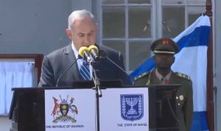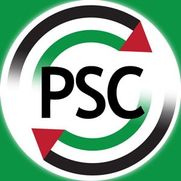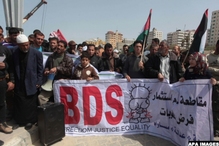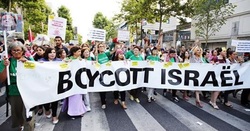11 july 2016

The Palestinian BDS National Committee (BNC), the broadest coalition in Palestinian civil society, has offered its congratulation and thanks, to both the Presbyterian Church (USA) and the Unitarian Universalist General Assembly, for their respective and powerful votes, in the weeks past, towards advancing solidarity with Palestinian rights under international law within faith communities in the United States.
Majorities of both denominations’ general conferences expressed strong support for nonviolent measures to uphold Palestinian human rights and end Israeli injustices against the Palestinian people.
Furthermore, it was decisively voted to prayerfully study the BDS Call, issued by the absolute majority in Palestinian civil society in 2005, and to engage with its authors and sponsors.
The Presbyterian Church (USA) assembly overwhelmingly called on Israel to end its gross mistreatment of Palestinian children and on Re/MAX to follow through on a recent promise to stop profiting from sales of homes in illegal Israeli settlements. It also called on U.S. Congress to hold hearings on the use of U.S. military and police equipment by the Israeli government.
The Unitarian Universalist General Assembly majority (54%) voted to endorse the Unitarian Universalist Association’s recent divestment from companies complicit in Israeli apartheid. While falling short of the 2/3 majority needed to pass the resolution, this majority vote showed clear support for the church’s prior action to divest from companies profiting from Israeli occupation and apartheid.
Other faith communities that have adopted economic measures against Israel’s occupation in the last 2 years include the United Methodist Church, United Church of Christ, Quakers, Mennonite Central Committee, the Catholic Conference of Major Superiors of Men [PDF], and the Alliance of Baptists.
Original article at BDS official.
Majorities of both denominations’ general conferences expressed strong support for nonviolent measures to uphold Palestinian human rights and end Israeli injustices against the Palestinian people.
- Presbyterian Church (USA) calls for studying Palestinian BDS call and engage with its authors in a landslide vote
- 54% of Unitarian Universalists assembly vote for divestment against Israel’s occupation
- Economic measures against Israel’s occupation have been adopted also by the United Methodist Church, United Church of Christ, Quakers, Mennonite Central Committee, the Catholic Conference of Major Superiors of Men [PDF], and the Alliance of Baptists.
Furthermore, it was decisively voted to prayerfully study the BDS Call, issued by the absolute majority in Palestinian civil society in 2005, and to engage with its authors and sponsors.
The Presbyterian Church (USA) assembly overwhelmingly called on Israel to end its gross mistreatment of Palestinian children and on Re/MAX to follow through on a recent promise to stop profiting from sales of homes in illegal Israeli settlements. It also called on U.S. Congress to hold hearings on the use of U.S. military and police equipment by the Israeli government.
The Unitarian Universalist General Assembly majority (54%) voted to endorse the Unitarian Universalist Association’s recent divestment from companies complicit in Israeli apartheid. While falling short of the 2/3 majority needed to pass the resolution, this majority vote showed clear support for the church’s prior action to divest from companies profiting from Israeli occupation and apartheid.
Other faith communities that have adopted economic measures against Israel’s occupation in the last 2 years include the United Methodist Church, United Church of Christ, Quakers, Mennonite Central Committee, the Catholic Conference of Major Superiors of Men [PDF], and the Alliance of Baptists.
Original article at BDS official.
6 july 2016

nsnbc : Israeli Prime Minister Benjamin Netanyahu, on Monday, left Israel to visit several African countries. Netanyahu aims at finding new trade partners in Africa as Israel increasingly feels the impact of the international Boycott Divestment Sanctions (BDS) campaign.
The Africa tour of Benjamin Netanyahu is the Prime Minister’s first, and the first Africa tour by an Israeli prime minister since the late PM Yitzak Rabin visited Morocco in 1999.
Before his departure the office of the Prime Minister released a video in which Netanyahu described his Africa tour as a “historic visit” that was of great importance “from diplomatic, economic and security perspectives”.
Addressing dignitaries in Entebbe, Uganda, Netanyahu said: “I am pleased that Israel is going back to Africa in a big way. .. We are opening Africa to Israel again”.
Netanyahu’s four-day tour will take him to Uganda, Kenya, Rwanda, and Ethiopia. The first leg of his journey takes Netanyahu to Entebbe, Uganda, where he will meet with leaders from seven African nations including Uganda, Kenya, Rwanda, South Sudan, Ethiopia, Zambia and Tanzania.
The office of the Israeli Prime Minister reported that Netanyahu is accompanied by a delegation of over 50 business people from 50 companies “to forge commercial ties with African companies and countries”. Israeli business delegates will participate in economic seminars with their African counterparts in Kenya and Ethiopia.
Israel has, over the past years, increased its focus on Africa with Defense Minister Avigdor Lieberman touring the continent to meet politicians and businessmen. The increased focus on Africa and Netanyahu’s “historic” visit comes against the backdrop of an increasingly successful international Boycott Divestment Sanctions (BDS) campaign against Israel.
Israel has also tried to reach out to South Africa, one of the strongest supporters of Palestine on the African continent. Until the end of the apartheid regime, South Africa was one of the strongest and closest Israeli partners in Africa.
In March Dore Gold, the Director-General of Israel’s Foreign Ministry, traveled to South Africa in an attempt to mend and strengthen ties between the two countries. Among African leaders who have visited Israel in recent years were Kenya’s President Uhuru Kenyatta and Liberia’s President Ellen Johnson Sirleaf.
Related: PM: Africa has no better friend than Israel
The Africa tour of Benjamin Netanyahu is the Prime Minister’s first, and the first Africa tour by an Israeli prime minister since the late PM Yitzak Rabin visited Morocco in 1999.
Before his departure the office of the Prime Minister released a video in which Netanyahu described his Africa tour as a “historic visit” that was of great importance “from diplomatic, economic and security perspectives”.
Addressing dignitaries in Entebbe, Uganda, Netanyahu said: “I am pleased that Israel is going back to Africa in a big way. .. We are opening Africa to Israel again”.
Netanyahu’s four-day tour will take him to Uganda, Kenya, Rwanda, and Ethiopia. The first leg of his journey takes Netanyahu to Entebbe, Uganda, where he will meet with leaders from seven African nations including Uganda, Kenya, Rwanda, South Sudan, Ethiopia, Zambia and Tanzania.
The office of the Israeli Prime Minister reported that Netanyahu is accompanied by a delegation of over 50 business people from 50 companies “to forge commercial ties with African companies and countries”. Israeli business delegates will participate in economic seminars with their African counterparts in Kenya and Ethiopia.
Israel has, over the past years, increased its focus on Africa with Defense Minister Avigdor Lieberman touring the continent to meet politicians and businessmen. The increased focus on Africa and Netanyahu’s “historic” visit comes against the backdrop of an increasingly successful international Boycott Divestment Sanctions (BDS) campaign against Israel.
Israel has also tried to reach out to South Africa, one of the strongest supporters of Palestine on the African continent. Until the end of the apartheid regime, South Africa was one of the strongest and closest Israeli partners in Africa.
In March Dore Gold, the Director-General of Israel’s Foreign Ministry, traveled to South Africa in an attempt to mend and strengthen ties between the two countries. Among African leaders who have visited Israel in recent years were Kenya’s President Uhuru Kenyatta and Liberia’s President Ellen Johnson Sirleaf.
Related: PM: Africa has no better friend than Israel
28 june 2016

A pro-Israel group has lost its legal action against three local authorities who passed resolutions in support of the Palestinians.
Today’s High Court, in London, ruling in favor of three councils which have boycotted Israeli settlement goods has been hailed as a “victory for the Palestinian-led boycott, divestment and sanctions campaign and for democracy”, according to the PNN.
The landmark ruling is also a rejection of the government’s attempts, in February, to stop councils from adopting ethical procurement and investment policies by implying that legal action could be brought successfully against them.
Sara Apps, interim Director of Palestine Solidarity Campaign (PSC), said:
“Today’s High Court ruling is an important victory for the Palestinian-led Boycott, Divestment and Sanctions campaign and for democracy itself. Councils have been told categorically by the High Court that there is nothing unlawful in ethically boycotting Israeli settlement goods, and PSC welcomes this ruling.
“The UK government’s attempts to intimidate local councils into dropping ethical procurement and investment policies clearly have no legal basis. Councils can legally adopt policies which avoid or end links with Israel’s illegal settlements.
“We applaud Leicester, Swansea and Gwynedd councils for standing up for their democratic right to free speech, and we look forward to working alongside them and other councils who choose to adopt policies in support of Palestinian human rights.”
The case against Leicester, Swansea and Gwynedd city councils was brought by Jewish Human Rights Watch, which has been ordered to pay the legal costs of all three councils.
Today’s High Court, in London, ruling in favor of three councils which have boycotted Israeli settlement goods has been hailed as a “victory for the Palestinian-led boycott, divestment and sanctions campaign and for democracy”, according to the PNN.
The landmark ruling is also a rejection of the government’s attempts, in February, to stop councils from adopting ethical procurement and investment policies by implying that legal action could be brought successfully against them.
Sara Apps, interim Director of Palestine Solidarity Campaign (PSC), said:
“Today’s High Court ruling is an important victory for the Palestinian-led Boycott, Divestment and Sanctions campaign and for democracy itself. Councils have been told categorically by the High Court that there is nothing unlawful in ethically boycotting Israeli settlement goods, and PSC welcomes this ruling.
“The UK government’s attempts to intimidate local councils into dropping ethical procurement and investment policies clearly have no legal basis. Councils can legally adopt policies which avoid or end links with Israel’s illegal settlements.
“We applaud Leicester, Swansea and Gwynedd councils for standing up for their democratic right to free speech, and we look forward to working alongside them and other councils who choose to adopt policies in support of Palestinian human rights.”
The case against Leicester, Swansea and Gwynedd city councils was brought by Jewish Human Rights Watch, which has been ordered to pay the legal costs of all three councils.
27 june 2016

Hamas’ Ministry of Agriculture in the Gaza Strip decided, on Monday, to stop importing watermelons from Israel after local farmers agreed to lower their prices by the end of the week.
Tahsin al-Saqa, director of the ministry’s marketing department, said that the consumer price of watermelon would be reduced from 10 shekels (approximately $2.50 US) per five kilograms to 10 shekels per eight kilograms.
Last Tuesday, according to Ma’an News Agency, the ministry started to allow watermelon imports from Israel in an attempt to exert pressure on local farmers to lower their prices. Al-Saqa said in his statement that 600 tons of watermelon had been imported from Israel in the last three days.
Prior to the seven-year embargo that the Gaza government placed on Israel’s watermelon imports, between 20,000 and 30,000 tons of watermelon were imported every year. Local production subsequently improved to the extent that it was able to completely cover market demand.
However, the land cultivated for watermelon production fell from 4,500 dunams (1,112 acres) last year to 3,500 dunams (865 acres) this year, causing the break in seven years of self-sufficient production of watermelon in the besieged coastal enclave.
Tahsin al-Saqa, director of the ministry’s marketing department, said that the consumer price of watermelon would be reduced from 10 shekels (approximately $2.50 US) per five kilograms to 10 shekels per eight kilograms.
Last Tuesday, according to Ma’an News Agency, the ministry started to allow watermelon imports from Israel in an attempt to exert pressure on local farmers to lower their prices. Al-Saqa said in his statement that 600 tons of watermelon had been imported from Israel in the last three days.
Prior to the seven-year embargo that the Gaza government placed on Israel’s watermelon imports, between 20,000 and 30,000 tons of watermelon were imported every year. Local production subsequently improved to the extent that it was able to completely cover market demand.
However, the land cultivated for watermelon production fell from 4,500 dunams (1,112 acres) last year to 3,500 dunams (865 acres) this year, causing the break in seven years of self-sufficient production of watermelon in the besieged coastal enclave.

On June 25th 2016, the Tomorrow’s Youth Forum (Moltaqa Sawa’d) in cooperation with the Partnership Institution For Development distributed water and date packages in Dura’s city center near occupied al-Khalil (Hebron) to raise awareness about the Boycott, Divestment & Sanctions Movement (BDS) against the Israeli occupation.
Along with the bundle, kids and youngsters from the center handed-out leaflets and stickers to shop owners and car drivers in the street to inform them about the common Israeli goods in the West Bank.
Although sales of Israeli goods in the West Bank have recently decreased by half, at least 70% of Palestinian imports continue to come from Israel or through it. Consumers in the West Bank have usually no access to substitute products from their own markets, and hence, are forced to buy staple-goods like fruits and vegetables from illegal Israeli settlements.
The few Palestinian products currently competing in the market need to be fostered by local communities, and the youth promoting the BDS movement are there to give them the boost they need.
Advocates of the BDS movement in Palestine and from across the globe continue the boycott campaigns. Representatives from different community groups — including BDS co-founder Omar Barghouti — spoke about their work and links to the boycott movement last April 2016 at the 5th Annual BDS Conference in Ramallah.
As international awareness of the occupation increases, Israeli officials grow anxious about the economic and political impact that the BDS movement is having in Europe and the United States. The United Nations Conference on Trade and Development (UNCTAD) reported that Israel had lost half of its foreign direct investment in 2014 mainly due to BDS efforts across the globe.
According to the Office for the Coordination of Humanitarian Affairs (OCHA), since the Naksa in 1967, Israel has established about 150 settlements in the West Bank and East Jerusalem, in addition to 100 “outposts” erected by settlers without official authorization.
The settler population in the West Bank and East Jerusalem is quickly approaching 600,000, and up to 43% of the occupied West Bank is allocated to local settler councils.
Along with the bundle, kids and youngsters from the center handed-out leaflets and stickers to shop owners and car drivers in the street to inform them about the common Israeli goods in the West Bank.
Although sales of Israeli goods in the West Bank have recently decreased by half, at least 70% of Palestinian imports continue to come from Israel or through it. Consumers in the West Bank have usually no access to substitute products from their own markets, and hence, are forced to buy staple-goods like fruits and vegetables from illegal Israeli settlements.
The few Palestinian products currently competing in the market need to be fostered by local communities, and the youth promoting the BDS movement are there to give them the boost they need.
Advocates of the BDS movement in Palestine and from across the globe continue the boycott campaigns. Representatives from different community groups — including BDS co-founder Omar Barghouti — spoke about their work and links to the boycott movement last April 2016 at the 5th Annual BDS Conference in Ramallah.
As international awareness of the occupation increases, Israeli officials grow anxious about the economic and political impact that the BDS movement is having in Europe and the United States. The United Nations Conference on Trade and Development (UNCTAD) reported that Israel had lost half of its foreign direct investment in 2014 mainly due to BDS efforts across the globe.
According to the Office for the Coordination of Humanitarian Affairs (OCHA), since the Naksa in 1967, Israel has established about 150 settlements in the West Bank and East Jerusalem, in addition to 100 “outposts” erected by settlers without official authorization.
The settler population in the West Bank and East Jerusalem is quickly approaching 600,000, and up to 43% of the occupied West Bank is allocated to local settler councils.
26 june 2016

The Public Institution for Social Security (PIFSS) in Kuwait has decided, as reported in the Kuwaiti media, to divest its funds from G4S, a company that is profiting from the Israeli occupation and has a notorious record of human rights abuses. The decision comes following calls from BDS Kuwait and the Palestinian BDS National Committee (BNC), the largest coalition in Palestinian civil society, on PIFSS to divest from G4S.
Earlier in May, a parliamentary inquiry by Kuwaiti MP Faisal Al-Duwaisan directed to the Ministry of Finance was submitted raising questions about the nature of the shares that PIFSS held in G4S, a company that is profiting from Israeli international law violations committed against the Palestinian people. In his response to the parliamentary inquiry, the Kuwaiti Minister of Finance, who is also the Chairman of the Board of Directors for the PIFSS, confirmed that PIFSS has sold all its shares in G4S.
Guman Mussa, BDS Campaigns Coordinator in the Arab World, welcomed the new victory against G4S saying: “The decision of PIFSS in Kuwait to respond to a call made by Palestinian civil society and BDS Kuwait affirms that the Palestinian cause is part and parcel of the consciousness of the Kuwaiti people. Kuwait shines a glimmer of hope against normalization with Israel’s regime of occupation and settler-colonialism”.
G4S, a British-Danish security company that operates in more than 125 countries around the world, had announced in March its intention to exit the Israeli market following mounting global pressure and financial losses incurred as a result of BDS campaigns. Nonetheless, the company has gained an ill-famed reputation not only due to the human rights abuses in which it is involved but also for repeatedly contradicting its promises to divest from the Israeli occupation. This has led BDS campaigners to accuse the company of dishonesty and deception. Since the March announcement, BDS campaigns against G4S have been escalating globally, not least in the Arab world.
Mussa added: “We shall continue with our campaigns against G4S both globally and in the Arab world due to its complicity in crimes committed by the occupation, knowing that BDS activists – from Kuwait, Lebanon and Jordan to Egypt and Morocco – are escalating the pressure against the company.”
“G4S clients in the region are responding positively to the campaign. Many have assured us that they are seriously exploring the possibility of severing their relationship with G4S due to its role in Israeli violations of Palestinian rights.”
Commenting on the news, BDS Kuwait stated: “Kuwait has always been and still is at the forefront of supporting the Palestinians in their struggle for freedom, justice and self-determination. The decision by PIFSS rightly distances Kuwait from any suspicion of involvement with companies profiting from occupation and reaffirms Kuwait’s commitment to the rights of the Palestinian people as well as our responsibility as Kuwaitis to combat normalization”.
Mussa concluded: “G4S claimed it was withdrawing from Israel ‘for entirely commercial reasons’, but that is the very logic of the BDS campaigns for corporate accountability. As was the case at the height of the international boycott of apartheid South Africa, BDS pressure, as this latest success in Kuwait shows, is making some of the world’s largest corporations realize that profiting from Israel’s regime of oppression is becoming commercially untenable”.
Background Information
– G4S announced in March 2016 that it will end all its contracts with the Israeli military, prison services, police and settlements. The Financial Times reported that G4S was “extracting itself from reputationally damaging work.”
– If BDS compels G4S to follow through with its announcement by ending all forms of complicity in Israel’s violations of international law, G4S would become the fourth multinational to abandon the Israeli market, in less than a year, due to heavy losses and/or reputational risk.
– In September 2015, French corporate giant Veolia set the trend by selling off all of its businesses in Israel after losing tenders and contracts worth billions of dollars following a seven-year BDS campaign against its role in illegal Israeli settlement projects.
– Irish building materials corporation CRH has more recently exited the Israeli market, selling off its 25% stake in the Israeli occupation-profiteer Nesher Cement.
– French telecommunications giant Orange announced earlier this year the termination of its franchise relationship with Israeli Partner Communications, after intense BDS pressure in France and Egypt.
– In a related major development, the $20-billion pension fund of the United Methodist Churchdeclared in January 2016 the five largest Israeli banks off limits for investment and divested from the two that it held in its portfolios.
– The Israel Export Institute has revealed that Israel’s exports in 2015 have dropped by 7% over 2014.
– Foreign direct investment in Israel dropped by 46% in 2014 as compared to 2013, according to a UN report. One of the report’s authors admitted that BDS played a key role in this sharp drop.
– Moody’s, a leading credit ratings agency, warns: “the Israeli economy could suffer should BDS gain greater traction.”
– In addition to abandoning its Israeli contracts, G4S announced in March it was selling its mass incarceration businesses that operate youth detention centers in the UK and the US. It is accused by campaigners of involvement in racist and abusive practices.
Earlier in May, a parliamentary inquiry by Kuwaiti MP Faisal Al-Duwaisan directed to the Ministry of Finance was submitted raising questions about the nature of the shares that PIFSS held in G4S, a company that is profiting from Israeli international law violations committed against the Palestinian people. In his response to the parliamentary inquiry, the Kuwaiti Minister of Finance, who is also the Chairman of the Board of Directors for the PIFSS, confirmed that PIFSS has sold all its shares in G4S.
Guman Mussa, BDS Campaigns Coordinator in the Arab World, welcomed the new victory against G4S saying: “The decision of PIFSS in Kuwait to respond to a call made by Palestinian civil society and BDS Kuwait affirms that the Palestinian cause is part and parcel of the consciousness of the Kuwaiti people. Kuwait shines a glimmer of hope against normalization with Israel’s regime of occupation and settler-colonialism”.
G4S, a British-Danish security company that operates in more than 125 countries around the world, had announced in March its intention to exit the Israeli market following mounting global pressure and financial losses incurred as a result of BDS campaigns. Nonetheless, the company has gained an ill-famed reputation not only due to the human rights abuses in which it is involved but also for repeatedly contradicting its promises to divest from the Israeli occupation. This has led BDS campaigners to accuse the company of dishonesty and deception. Since the March announcement, BDS campaigns against G4S have been escalating globally, not least in the Arab world.
Mussa added: “We shall continue with our campaigns against G4S both globally and in the Arab world due to its complicity in crimes committed by the occupation, knowing that BDS activists – from Kuwait, Lebanon and Jordan to Egypt and Morocco – are escalating the pressure against the company.”
“G4S clients in the region are responding positively to the campaign. Many have assured us that they are seriously exploring the possibility of severing their relationship with G4S due to its role in Israeli violations of Palestinian rights.”
Commenting on the news, BDS Kuwait stated: “Kuwait has always been and still is at the forefront of supporting the Palestinians in their struggle for freedom, justice and self-determination. The decision by PIFSS rightly distances Kuwait from any suspicion of involvement with companies profiting from occupation and reaffirms Kuwait’s commitment to the rights of the Palestinian people as well as our responsibility as Kuwaitis to combat normalization”.
Mussa concluded: “G4S claimed it was withdrawing from Israel ‘for entirely commercial reasons’, but that is the very logic of the BDS campaigns for corporate accountability. As was the case at the height of the international boycott of apartheid South Africa, BDS pressure, as this latest success in Kuwait shows, is making some of the world’s largest corporations realize that profiting from Israel’s regime of oppression is becoming commercially untenable”.
Background Information
– G4S announced in March 2016 that it will end all its contracts with the Israeli military, prison services, police and settlements. The Financial Times reported that G4S was “extracting itself from reputationally damaging work.”
– If BDS compels G4S to follow through with its announcement by ending all forms of complicity in Israel’s violations of international law, G4S would become the fourth multinational to abandon the Israeli market, in less than a year, due to heavy losses and/or reputational risk.
– In September 2015, French corporate giant Veolia set the trend by selling off all of its businesses in Israel after losing tenders and contracts worth billions of dollars following a seven-year BDS campaign against its role in illegal Israeli settlement projects.
– Irish building materials corporation CRH has more recently exited the Israeli market, selling off its 25% stake in the Israeli occupation-profiteer Nesher Cement.
– French telecommunications giant Orange announced earlier this year the termination of its franchise relationship with Israeli Partner Communications, after intense BDS pressure in France and Egypt.
– In a related major development, the $20-billion pension fund of the United Methodist Churchdeclared in January 2016 the five largest Israeli banks off limits for investment and divested from the two that it held in its portfolios.
– The Israel Export Institute has revealed that Israel’s exports in 2015 have dropped by 7% over 2014.
– Foreign direct investment in Israel dropped by 46% in 2014 as compared to 2013, according to a UN report. One of the report’s authors admitted that BDS played a key role in this sharp drop.
– Moody’s, a leading credit ratings agency, warns: “the Israeli economy could suffer should BDS gain greater traction.”
– In addition to abandoning its Israeli contracts, G4S announced in March it was selling its mass incarceration businesses that operate youth detention centers in the UK and the US. It is accused by campaigners of involvement in racist and abusive practices.
21 june 2016

Israeli president Reuven Rivlin has said that the ongoing activities of the international boycott campaign against Israel, which is known as the Boycott, Divestment and Sanctions Movement (BDS), adversely affected Israel.
During his meeting on Monday with Belgian premier Charles Michel, Rivlin warned that there would be more serious consequences for Israel politically, economically and militarily if BDS continued its activities against it.
The Israeli government last May 31 held an anti-BDS conference at the UN General Assembly in an attempt to incite the international community against the movement and curtail its role in supporting the Palestinian cause.
BDS is a global campaign attempting to pressure Israel politically and economically in order to force it to abide by the international law, end its occupation of the Palestinian land and the Golan Heights, provide full equality for its Arab-Palestinian citizens, and respect the Palestinian refugees' right of return.
During his meeting on Monday with Belgian premier Charles Michel, Rivlin warned that there would be more serious consequences for Israel politically, economically and militarily if BDS continued its activities against it.
The Israeli government last May 31 held an anti-BDS conference at the UN General Assembly in an attempt to incite the international community against the movement and curtail its role in supporting the Palestinian cause.
BDS is a global campaign attempting to pressure Israel politically and economically in order to force it to abide by the international law, end its occupation of the Palestinian land and the Golan Heights, provide full equality for its Arab-Palestinian citizens, and respect the Palestinian refugees' right of return.
20 june 2016

Facebook, in present-day Israel, has hired Jordana Cutler as its head of Policy and Communications. Cutler is a longtime senior advisor to Israeli Prime Minister Benjamin Netanyahu and chief of staff to Israeli Ambassador Ron Dermer.
According to the Alternative Information Center in Beit Sahour, Israeli Public Security, Strategic Affairs and Information Minister Gilad Erdan congratulated Cutler on her appointment, last week, at the Hezliya conference, an Israeli security and national policy meeting.
“There has been an advance in dialogue between the State of Israel and Facebook,” he acknowledged. He added, “Facebook realizes that it has a responsibility to monitor its platform and remove content. I hope it will be regulated for good.”
Cutler’s appointment indicates a burgeoning partnership between the Israeli government and Facebook. Considering Israel’s propensity to arrest Palestinians for Facebook posts and its endeavors to silence the Boycott, Divestment, and Sanctions (BDS) movement, such collaboration is cause for concern.
Since the popular uprising started in October 2015, Israel has arrested at least 150 Palestinians over Facebook posts it labeled as “incitement.”
The Israeli government allocated $26 million for 2016 to launch cyber warfare to “dismantle the infrastructure” of the BDS movement. The BDS National Committee surmises that Israel is be behind cyber attacks meant to shut down its website.
According to the Alternative Information Center in Beit Sahour, Israeli Public Security, Strategic Affairs and Information Minister Gilad Erdan congratulated Cutler on her appointment, last week, at the Hezliya conference, an Israeli security and national policy meeting.
“There has been an advance in dialogue between the State of Israel and Facebook,” he acknowledged. He added, “Facebook realizes that it has a responsibility to monitor its platform and remove content. I hope it will be regulated for good.”
Cutler’s appointment indicates a burgeoning partnership between the Israeli government and Facebook. Considering Israel’s propensity to arrest Palestinians for Facebook posts and its endeavors to silence the Boycott, Divestment, and Sanctions (BDS) movement, such collaboration is cause for concern.
Since the popular uprising started in October 2015, Israel has arrested at least 150 Palestinians over Facebook posts it labeled as “incitement.”
The Israeli government allocated $26 million for 2016 to launch cyber warfare to “dismantle the infrastructure” of the BDS movement. The BDS National Committee surmises that Israel is be behind cyber attacks meant to shut down its website.
